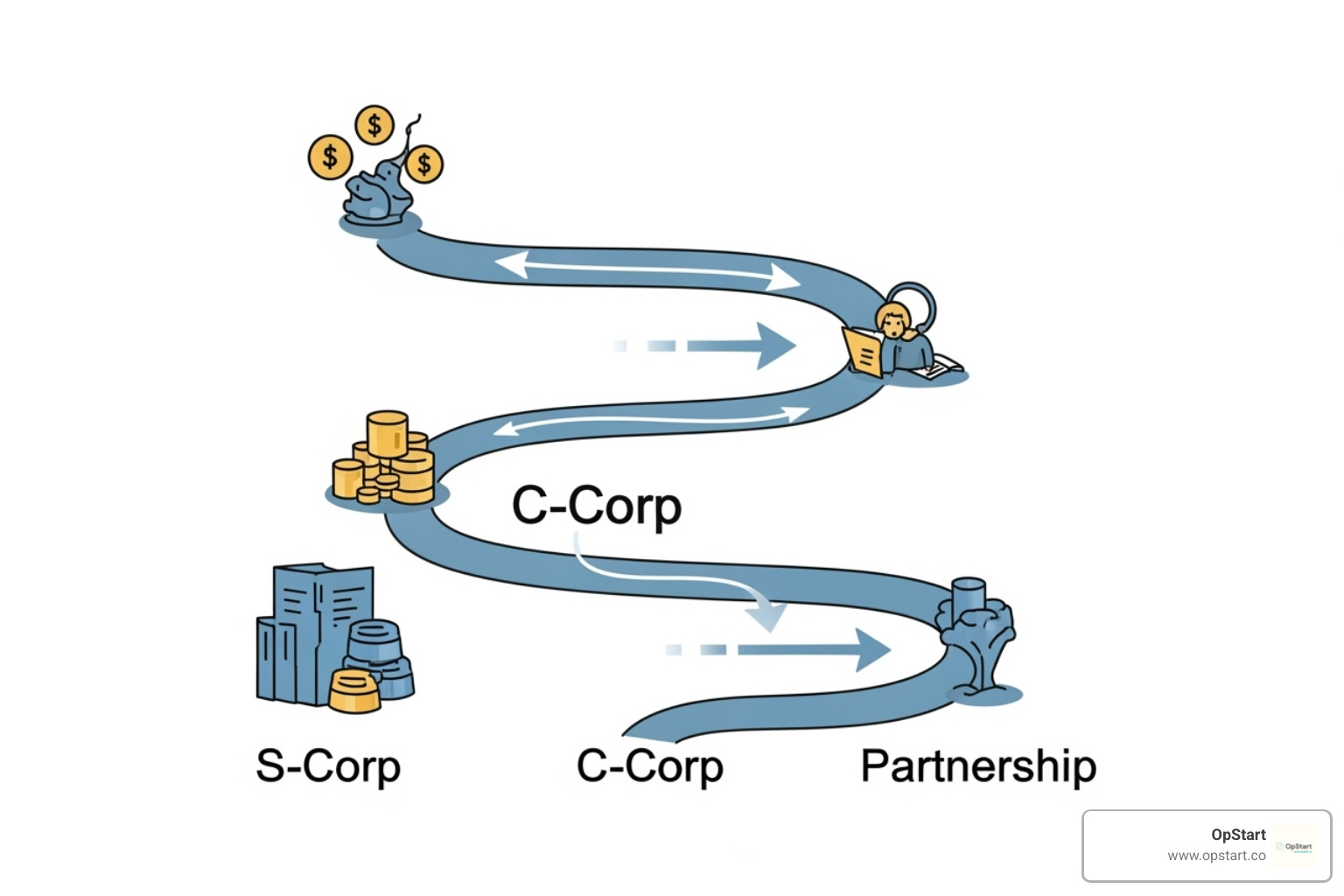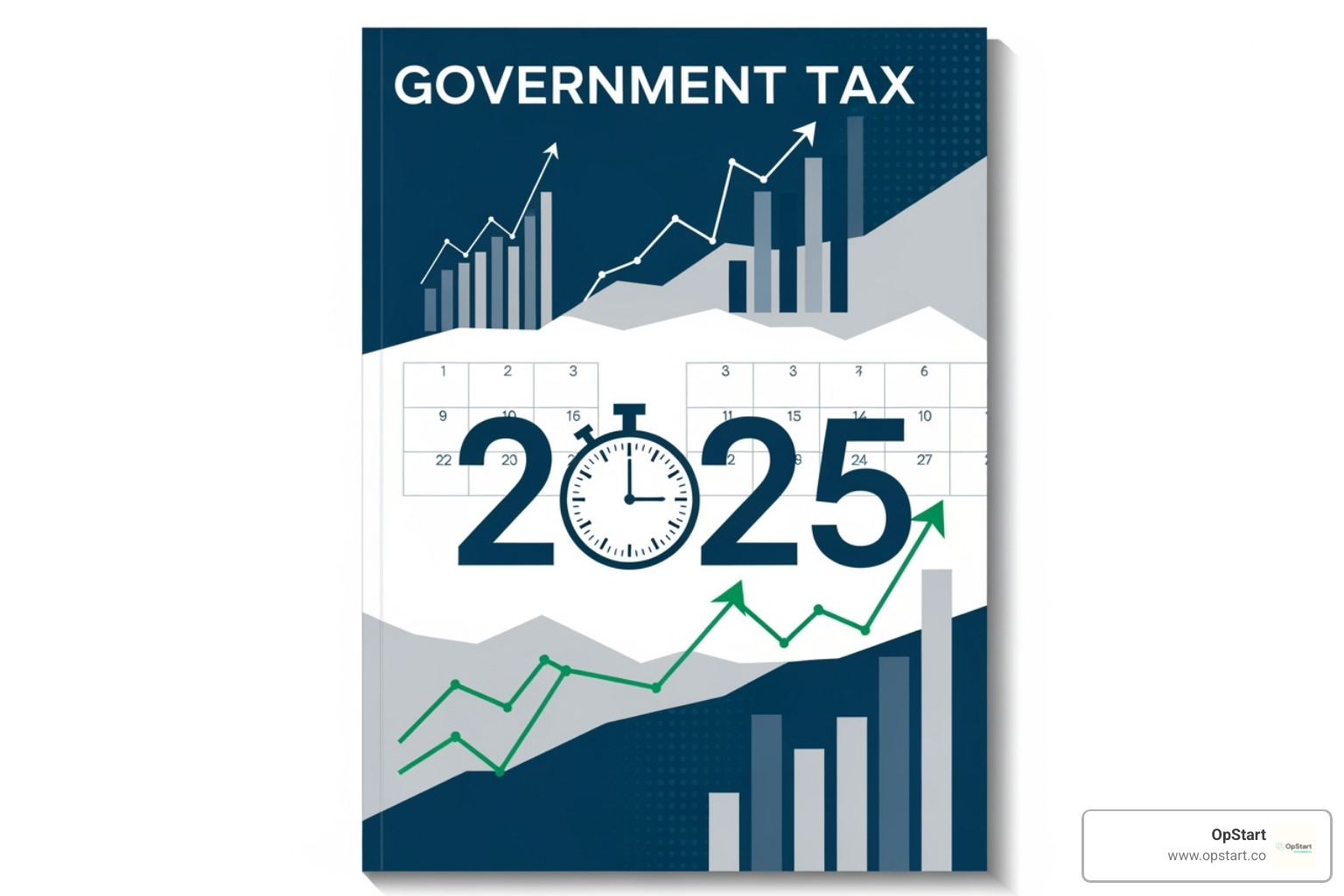Why Tax Deadlines Matter for Every Startup Founder
When are taxes due 2025? For most individuals and startups, the federal income tax deadline is April 15, 2025. However, the answer isn’t one-size-fits-all—S corporations and partnerships must file by March 17, 2025, self-employed individuals have quarterly estimated tax deadlines, and various state and payroll tax obligations add complexity.
Here are the critical 2025 tax deadlines you need to know:
- January 31, 2025: W-2 and 1099-NEC forms due to employees and contractors
- March 17, 2025: S corporations (Form 1120-S) and partnerships (Form 1065) filing deadline
- April 15, 2025: Individual tax returns (Form 1040) and C corporation returns (Form 1120) due; first quarterly estimated tax payment for 2025
- June 16, 2025: Second quarterly estimated tax payment
- September 15, 2025: Third quarterly estimated tax payment; extended deadline for S corps and partnerships
- October 15, 2025: Extended deadline for individual and C corporation returns
- January 15, 2026: Fourth quarterly estimated tax payment for 2025 tax year
Missing these dates isn’t just an administrative hiccup. Late filing penalties start at 5% of unpaid taxes per month and can climb to 25% of your total tax bill, while late payment penalties add another 0.5% monthly, plus interest. For cash-strapped startups, these penalties can derail your runway.
I’m Maurina Venturelli, Head of GTM at OpStart. Having scaled companies like Sumo Logic and LiveAction through IPO, I know that tax compliance is critical for maintaining investor confidence and operational health. At OpStart, we help founders steer these challenges so they can focus on growth.

1. Master the Key Federal Tax Deadlines
Understanding when are taxes due 2025 and building a system around those dates transforms tax season from a panic-inducing scramble into a manageable part of your startup’s financial rhythm. The federal tax calendar isn’t as simple as circling one date; different business structures and income types have their own deadlines. Let’s break down what matters most.
Individual Taxpayer Deadlines (Form 1040)
For solo founders or those reporting business income on Schedule C, your main deadline is April 15, 2025. This is when your 2024 federal income tax return (Form 1040) is due and any taxes you owe for 2024 must be paid. This date is also your last chance to contribute to a traditional IRA, Roth IRA, or Health Savings Account (HSA) for the 2024 tax year.
Need more time? File Form 4868 for an automatic six-month extension to October 15, 2025. Here’s the critical part: an extension to file is not an extension to pay. You must still pay your estimated tax liability by April 15, 2025, to avoid penalties and interest. The IRS has detailed guidance on how to file an extension with the IRS if you need to go that route.
Deadlines for Startups and Business Entities
Your business structure determines your filing deadlines, and getting this right is non-negotiable for staying compliant.

S Corporations and Partnerships operate on an earlier timeline. If your startup is an S corp (filing Form 1120-S) or partnership (filing Form 1065), your deadline is March 17, 2025. These are pass-through entities, so profits and losses flow to the owners’ personal returns. An extension moves the filing deadline to September 15, 2025.
C Corporations follow a different rhythm. For calendar-year C corps, Form 1120 and any taxes owed are due on April 15, 2025. C corporations pay corporate income tax directly. An extension for C corps moves the filing deadline to October 15, 2025.
Limited Liability Companies (LLCs) are flexible. A single-member LLC defaults to being taxed as a sole proprietorship (due April 15). A multi-member LLC is typically taxed as a partnership (due March 17). However, an LLC can elect to be taxed as an S or C corporation, adopting their respective deadlines. Knowing your LLC’s classification is essential to understanding when are taxes due 2025.
At OpStart, we handle these complexities, from choosing the right entity structure to ensuring every form is filed on time. We manage startup tax filing so you can focus on building your company.
| Entity Type | Form to File | Standard Filing Deadline (2024 Tax Year) | Extended Filing Deadline (2024 Tax Year) |
|---|---|---|---|
| Individuals / Sole Proprietors | Form 1040 | April 15, 2025 | October 15, 2025 |
| S Corporations | Form 1120-S | March 17, 2025 | September 15, 2025 |
| Partnerships | Form 1065 | March 17, 2025 | September 15, 2025 |
| C Corporations | Form 1120 | April 15, 2025 | October 15, 2025 |
Quarterly Estimated Tax Payment Due Dates
The U.S. tax system is pay-as-you-go. If you’re self-employed or have income not subject to withholding and expect to owe $1,000 or more when you file ($500 or more for C corporations), you generally need to make quarterly estimated tax payments using Form 1040-ES. This prevents a massive tax bill on April 15 and helps you avoid underpayment penalties.
For the 2025 tax year, your quarterly estimated tax payments are due on April 15, 2025, June 16, 2025, September 15, 2025, and January 15, 2026.

To avoid penalties, you can use the IRS safe harbor rule: pay at least 90% of your current year’s tax liability or 100% of your previous year’s tax liability (110% if your Adjusted Gross Income exceeded $150,000). If your income fluctuates, you can adjust your payments each quarter. We help founders forecast their tax obligations to time these payments strategically, saving thousands in penalties and interest.
2. Look Beyond Federal: State, Local, and Special Deadlines
Federal deadlines are just the beginning. As a founder, you’re also juggling state income taxes, payroll obligations, and potentially international filing requirements, each with its own calendar. Missing them can mean penalties that eat into your runway.
State Income Tax Filing Deadlines
Most states with an income tax align their deadline with the federal government’s April 15, 2025. However, not every state follows this rule. A few, like Hawaii, Delaware, and Louisiana, offer later deadlines. It’s critical to verify your specific state’s requirements, as some have unique rules for extensions and payments. Nine states—including Florida, Texas, and Washington—don’t collect income tax at all. Always check with your state’s tax agency for the exact dates and rules that apply to you.
Important Dates for Employers
The moment you hire your first employee or pay a contractor, you step into a new world of tax responsibilities. January 31, 2025 is a key date: by then, you must provide Form W-2 to every employee and Form 1099-NEC to any independent contractor you paid $600 or more for services during 2024.
Crucially, you must also file copies of these forms with the Social Security Administration (for W-2s) and the IRS (for 1099-NECs) by the same January 31 deadline. Getting these forms out on time is essential for compliance and shows respect for your team, who need them to file their own taxes. For more on managing these expenses, our guide on business startup tax deductions can help.
Special Deadlines: US Citizens Abroad and FBAR
If you’re a U.S. citizen or resident alien living outside the country, the IRS gives you an automatic extension to June 16, 2025 to file your 2024 federal tax return. Just remember that when are taxes due 2025 for payment purposes is still April 15. If you owe money, interest starts accruing from that date.
Additionally, there’s a form many founders overlook: FinCEN Form 114, the FBAR (Foreign Bank and Financial Accounts Report). If you had a financial interest in or signature authority over foreign financial accounts with a combined value exceeding $10,000 at any point during 2024, you must file this form by April 15, 2025. The FBAR isn’t filed with your tax return; it goes to the Financial Crimes Enforcement Network. While there’s an automatic extension to October 15, 2025, the penalties for failing to file are steep.
3. Your Guide to Knowing When Taxes Are Due 2025
Keeping track of tax deadlines can feel overwhelming, but with the right approach, understanding when are taxes due 2025 becomes far less daunting. Build a system once, then let it work for you all year long.
Use the Official IRS Tax Calendar
When in doubt, go straight to the source. The Official 2025 IRS Tax Calendar (Publication 509) is your comprehensive guide to staying compliant. We recommend downloading it and adding every applicable deadline to your calendar with reminders.
Publication 509 includes a General Tax Calendar for individuals, an Employer’s Tax Calendar for payroll obligations, and an Excise Tax Calendar for specific industries. A quick review at the start of the year can prevent major headaches and save you from penalties.

Understanding when are taxes due 2025 if you file an extension
A common and expensive mistake is confusing an extension to file with an extension to pay. They are not the same. Filing an extension (Form 4868 for individuals or Form 7004 for businesses) pushes your paperwork deadline to September or October. However, your estimated tax payment is still due by the original deadline (March 17 or April 15).
If you don’t pay on time, you’ll incur late-payment penalties and interest, even with a valid filing extension. The IRS is giving you breathing room for paperwork, not for payment. Always estimate what you owe and pay it by the original due date to avoid surprises.
What Are the Penalties for Filing or Paying Late?
The IRS enforces deadlines with significant penalties that can drain a startup’s budget. The late-filing penalty is the most severe: 5% of your unpaid taxes for each month your return is late, capped at 25%. The late-payment penalty is 0.5% of the unpaid taxes per month, also capped at 25%. If both penalties apply in the same month, the total monthly hit is still 5%.
On top of that, interest accrues daily on both your unpaid tax and any penalties. For pass-through entities like S corporations and partnerships, the late-filing penalty is a flat dollar amount per partner per month, which can add up shockingly fast.
The IRS may waive penalties if you can demonstrate “reasonable cause,” but the burden of proof is on you. Proactive planning is your best defense against these avoidable costs. At OpStart, we build systems to keep our founders ahead of every deadline, so they never have to worry about penalties eating into their runway.
Frequently Asked Questions about 2025 Tax Deadlines
We get asked about when are taxes due 2025 all the time. Here are answers to the most common questions that keep founders up at night.
When can I start filing my 2024 taxes in 2025?
The IRS typically opens its electronic filing (e-file) system in late January. While you can prepare your return earlier, you can’t submit it until the system officially opens. To file early, gather your W-2s, 1099s, and other tax documents in advance. Filing electronically and early means you could get any expected refund within 21 days—cash you can reinvest in your startup.
What happens if a tax deadline falls on a weekend or holiday?
The IRS has a straightforward rule: if any tax deadline lands on a Saturday, Sunday, or a federal legal holiday, it automatically shifts to the next business day. This applies to both filing and payment deadlines. For instance, June 15, 2025, is a Sunday, so the second quarterly payment deadline moves to Monday, June 16, 2025. This federal rule covers IRS obligations; state tax deadlines might follow different rules depending on state holidays.
What is the deadline for R&D tax credits for my startup?
The Research & Development tax credit is a powerful tool for startups. The deadline for claiming the R&D tax credit on Form 6765 is the same as your income tax return deadline, including any extensions. For C corporations and individuals, that’s April 15 (or October 15 with an extension). For S corporations and partnerships, it’s March 17 (or September 15 with an extension).
A key benefit is that you can claim the credit retroactively by filing an amended return, generally up to three years after your original filing. Many startups in software and product development qualify but don’t realize it. Check our guide on whether you qualify for R&D tax credits to ensure you’re not leaving money on the table.
Don’t Let Tax Deadlines Derail Your Startup
Knowing when are taxes due 2025 is about protecting your startup’s financial health and keeping your focus on growth. We’ve covered the key deadlines: March 17 for S corps and partnerships, April 15 for C corps and individuals, and the crucial quarterly estimated tax dates that keep you compliant.
Managing these deadlines while building a company is a major challenge. Missing them leads to steep penalties—a 5% monthly late-filing penalty, plus late-payment fees and interest—that drain your runway. That’s capital that could have funded another engineer or extended your runway by months.
Tax compliance deserves attention, but it shouldn’t consume your time. Your expertise is in your product and your market. Our expertise at OpStart is in making sure your financial operations run smoothly, including handling all those taxes for startups deadlines.
We offer comprehensive financial operations—from bookkeeping to tax filings to CFO-level support—for a flat rate that scales with your business. We track every deadline so you never have to worry about missing one. Your time is your most valuable asset. Spend it building the future, not deciphering IRS publications. Let us handle the details while you focus on what only you can do—leading your startup to success.


